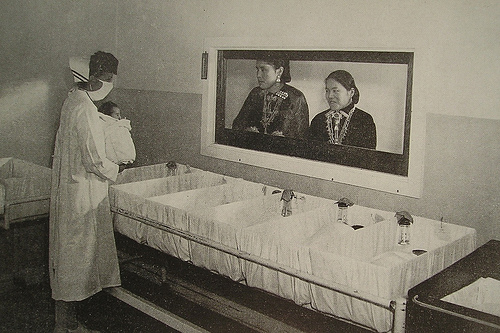
Image by bunky’s pickle via Flickr/Creative Commons, some rights reserved
I saw a lot of men up in arms on social media yesterday over a New Jersey Superior Court judge’s decision to allow a mother to ban the father-to-be of her unborn child from the delivery room. A lot of men are saying the ruling indicates fathers have no rights, that they’re seen only as sperm donors and monetary providers and that even when a father wants to be there for his child, the system is rigged in the woman’s favor.
In this particular case, I have to disagree. When I read the headline, “Dad can’t be in delivery room if mom doesn’t want him, New Jersey judge rules,†my initial thought was, “Damn, you hate the baby’s daddy that much?â€
My second thought: (Shaking my head.) Rough break for the dad, especially if it’s his first born. It’s not like that moment will happen again.
My third thought—still without reading anything about the case except for the headline—was, “Well, it is her healthcare and a medical procedure on her body, and he’s probably not even next of kin, so, yes she has a right to have a medical procedure performed on her body done without spectators in the room that she doesn’t want present. This is about privacy, not about decreasing rights for fathers.†And then I read this article which briefly explained the judge’s decision and it confirmed my line of thought. As I suspected, the man suing for what he saw as his right to be in the delivery room isn’t the woman’s husband. (And according to this report, that’s not what he asked for at all, so how the case turned into a delivery room battle, I don’t know.)
But here’s something important about this ruling: It “applies only to biological fathers not married to the mother.â€
There are different expectations in marriage. As I read about this case, I thought about biblical guidelines for marriage, specifically 1 Cor 7:4:
“The wife does not have authority over her own body but yields it to her husband. In the same way, the husband does not have authority over his own body but yields it to his wife.â€
And Gen. 2:24:
 “That is why a man leaves his father and mother and is united to his wife, and they become one flesh.â€
And I thought about how murky body ownership becomes in the context of marriage, under these guidelines. But could an unmarried soon-to-be dad use the same rubric to claim a right to be in the room for the birth of his child? In looser interpretations of the Genesis text (which ministers have been known to apply to steer youth and young adults away from sex outside of marriage), ministers have said you become one with and leave pieces of yourself with anyone you have sex with. In New Jersey, I imagine a religious court would have said that the man who brought the lawsuit essentially owned a portion of his ex-fianceé, and that he had a right to be in the delivery room.
That is the rubric men who are deeply offended by the judge’s decision are using. Whether they’re Christian or not, and whether they articulate their feelings this way or not, they’re expressing a very patriarchal idea of ownership over a woman’s body. It’s ideal if everyone involved in the making of a child is invested in the child’s arrival and in the idea of being a parent. But the emotional investment doesn’t erase the facts: parents-to-be don’t get to drop the “to-be†until after the baby is out of the womb, there are two individuals involved in child-making, and only one of them is the human incubator. As unified in many ways as sex can make a man and a woman, he’ll never be pregnant. He won’t experience the sickness, increased blood pressure, weight gain, organ stress, body distortion, hormone alteration, pain, bleeding, stitches, or any of the other medical complications that go along with pregnancy and childbirth. And maybe that’s why, as has been articulated in other rulings, “an expectant mother has a stronger right over her body and over her unborn child than the father.â€
And by the way, nothing about this ruling prevents the dad from being an active part of his child’s life. It just keeps him from being an added stressor in a dangerous situation and from being a voyeur in a private procedure.

This is my first time reading your blog. I agree with the principal. The woman is having the baby; and, even in marriage, if she does not want a particular person present when she has the child then he or she should not be. However, when you drop the notion that: ” parents-to-be don’t get to drop the “to-be†until after the baby is out of the womb” my retort is simple, our legal jurisprudence isn’t built under that premise. I vaguely remember some court decisions tying stating that men should be responsible for helping with the medical expenses of pregnancy because they are partial responsible.”
Anyway, it is worth some thought. The claim that there is a difference between post womb and pre-womb, just doesn’t pan out in our legal structure.